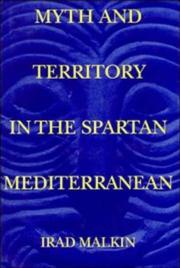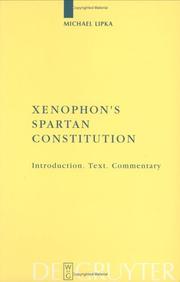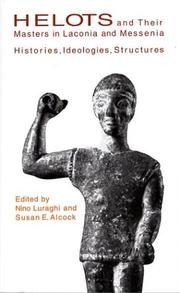| Listing 1 - 10 of 16 | << page >> |
Sort by
|

ISBN: 3515086358 9783515086356 Year: 2006 Publisher: Stuttgart Steiner
Abstract | Keywords | Export | Availability | Bookmark
 Loading...
Loading...Choose an application
- Reference Manager
- EndNote
- RefWorks (Direct export to RefWorks)
Sparta (Extinct city) --- Lacedaemon (Extinct city) --- Lakedaímon (Extinct city) --- Sparta (Ancient city) --- Greece --- History --- Antiquities

ISBN: 8834319850 9788834319857 Year: 2004 Volume: 2 Publisher: Milano Vita e pensiero
Abstract | Keywords | Export | Availability | Bookmark
 Loading...
Loading...Choose an application
- Reference Manager
- EndNote
- RefWorks (Direct export to RefWorks)
Sparta (Extinct city) --- History --- Lacedaemon (Extinct city) --- Lakedaímon (Extinct city) --- Sparta (Ancient city) --- Greece --- History. --- Antiquities --- Sparta (Extinct city) - History --- Sparta (Extinct city) - Biography


ISBN: 1905125119 9781905125111 Year: 2006 Publisher: Swansea Classical press of Wales
Abstract | Keywords | Export | Availability | Bookmark
 Loading...
Loading...Choose an application
- Reference Manager
- EndNote
- RefWorks (Direct export to RefWorks)
Sparta (Extinct city) --- Sparte (Ville ancienne) --- History, Military --- Congresses. --- History --- Histoire militaire --- Congrès --- Histoire --- Lacedaemon (Extinct city) --- Lakedaímon (Extinct city) --- Sparta (Ancient city) --- Greece --- Antiquities
Book
ISBN: 0300224613 9780300219012 9780300224610 0300219016 Year: 2016 Publisher: New Haven
Abstract | Keywords | Export | Availability | Bookmark
 Loading...
Loading...Choose an application
- Reference Manager
- EndNote
- RefWorks (Direct export to RefWorks)
An authoritative and refreshingly original consideration of the government and culture of ancient Sparta and her place in Greek history For centuries, ancient Sparta has been glorified in song, fiction, and popular art. Yet the true nature of a civilization described as a combination of democracy and oligarchy by Aristotle, considered an ideal of liberty in the ages of Machiavelli and Rousseau, and viewed as a forerunner of the modern totalitarian state by many twentieth-century scholars has long remained a mystery. In a bold new approach to historical study, noted historian Paul Rahe attempts to unravel the Spartan riddle by deploying the regime-oriented political science of the ancient Greeks, pioneered by Herodotus, Thucydides, Plato, Xenophon, and Polybius, in order to provide a more coherent picture of government, art, culture, and daily life in Lacedaemon than has previously appeared in print, and to explore the grand strategy the Spartans devised before the arrival of the Persians in the Aegean.
E-books --- Sparta (Extinct city) --- History. --- Politics and government. --- Lacedaemon (Extinct city) --- Lakedaímon (Extinct city) --- Sparta (Ancient city) --- Greece --- Antiquities --- HISTORY / Ancient / Greece.

ISBN: 0521411831 Year: 1994 Publisher: Cambridge Cambridge University press
Abstract | Keywords | Export | Availability | Bookmark
 Loading...
Loading...Choose an application
- Reference Manager
- EndNote
- RefWorks (Direct export to RefWorks)
Cities and towns, Ancient --- -Mythology, Greek --- Greeks --- -Greek mythology --- Ethnology --- Mediterranean race --- Geography, Ancient --- Colonization --- -Sparta (Extinct city) --- -Lacedaemon (Extinct city) --- Lakedaímon (Extinct city) --- Sparta (Ancient city) --- Greece --- Colonies --- Antiquities --- Mythology, Greek --- Greek mythology --- Sparta (Extinct city) --- Lacedaemon (Extinct city) --- Colonies. --- Sparta (Extinct city) - Colonies.

ISBN: 0415104130 0415642957 1134848935 1280329068 0203085078 9780203085073 9781280329067 6610329060 9786610329069 9780415104135 9781134848935 9781134848881 1134848889 9781134848928 1134848927 9780415642958 Year: 1994 Publisher: London Routledge
Abstract | Keywords | Export | Availability | Bookmark
 Loading...
Loading...Choose an application
- Reference Manager
- EndNote
- RefWorks (Direct export to RefWorks)
In the past twenty years the study of Sparta has come of age. Images prevalent earlier in the 20th century, of Spartans as hearty good fellows or scarlet-cloaked automata, have been superseded by more complex scholarly reactions. As interest has grown in the self-images projected by this most secretive of Greek cities, increasing attention has focused on how individual Greek writers from other states reacted to information, or disinformation about Sparta.The studies in this volume provide new insights into the traditional historians' question, ""What actually happened at Sparta?"". But the
Literature and history --- Greek literature --- Cities and towns in literature --- History --- Congresses --- History and criticism --- Sparta (Extinct city) --- In literature --- -Literature and history --- -Cities and towns in literature --- -History and literature --- History and poetry --- Poetry and history --- Balkan literature --- Byzantine literature --- Classical literature --- Classical philology --- Greek philology --- -Congresses --- -Lacedaemon (Extinct city) --- Lakedaímon (Extinct city) --- Sparta (Ancient city) --- Greece --- Antiquities --- -History and criticism --- -In literature --- -Balkan literature --- History and literature --- History and criticism&delete& --- History&delete& --- Lacedaemon (Extinct city) --- Congresses. --- Sparta (Extinct city) in literature --- Literature and history - Greece - History - Congresses --- Greek literature - History and criticism - Congresses --- Cities and towns in literature - Congresses --- Sparta (Extinct city) - In literature - Congresses

ISBN: 3110174669 311088724X 9783110174663 Year: 2002 Volume: 24 Publisher: Berlin de Gruyter
Abstract | Keywords | Export | Availability | Bookmark
 Loading...
Loading...Choose an application
- Reference Manager
- EndNote
- RefWorks (Direct export to RefWorks)
Der vorliegende Band bietet eine kritische Neuausgabe der unter dem Namen Xenophons (ca. 430 - 355 v. Chr.) überlieferten staatsphilosophischen Schrift Der Staat der Spartaner. Der griechische Text ist auf der Basis der wichtigsten Handschriften neu rekonstruiert worden. Ergänzt wird er von einer ausführlichen Einleitung, einem kritischen Kommentar und einer Übersetzung ins Englische. Die Einleitung diskutiert Fragen der Authentizität und der Datierung und informiert umfassend über Quellen und Rezeption, Sprache und Stil sowie über die Handschriftenlage. Der Kommentar ist sowohl philologischen wie auch historischen Problemen gewidmet. This work presents a new critical edition of The Spartan Constitution, a treatise in state philosophy attributed to the historian Xenophon (c. 430 - c. 355 B. C.). The Greek text, reconstructed on the basis of extant manuscript sources, is prefaced by an introduction and supplemented by a critical commentary and an English translation. The introduction discusses the problem of the text's authenticity and dating and provides a comprehensive account of its sources, reception, language, style and structure as well as an analysis of the manuscript sources and the textual tradition. The commentary addresses linguistic as well as historical problems.
Xenophon. --- Sparta (Extinct city) --- Sparte (Ville ancienne) --- Politics and government --- Politique et gouvernement --- Military art and science. --- Politics and government. --- Fighting --- Military power --- Military science --- Warfare --- Warfare, Primitive --- Naval art and science --- War --- Lacedaemon (Extinct city) --- Lakedaímon (Extinct city) --- Sparta (Ancient city) --- Greece --- Antiquities
Book
ISBN: 9783110342000 3110342006 9783110342512 3110342510 3110373491 9783110342529 3110342529 9783110373493 3110555522 9783110555523 Year: 2014 Volume: 23 Publisher: Berlin
Abstract | Keywords | Export | Availability | Bookmark
 Loading...
Loading...Choose an application
- Reference Manager
- EndNote
- RefWorks (Direct export to RefWorks)
Dem Athener Isokrates (ca. 436-338 v.Chr.) schreibt man seit jeher eine maßgebliche Rolle bei der ideengeschichtlichen Trennung von Rhetorik und Philosophie zu. Besonders die historischen Exempla in seinen Reden galten dabei lange Zeit als Beleg dafür, dass der ,Erbe der Sophistik' als Hauptgegner Platons den Anspruch sachlicher Moralität und Wahrhaftigkeit dem Zweck der Demonstration rhetorischer Brillanz untergeordnet habe. Thomas Blank untersucht in seiner Dissertation die Verwendung des bei Isokrates besonders prominenten Exemplums Sparta in dessen gesamtem Werk. Dabei werden erstmals Isokrates' eigene Bemerkungen zur technischen Gültigkeit bestimmter Argumentationsweisen für die Interpretation berücksichtigt. Es lässt sich zeigen, dass die scheinbaren Widersprüche im isokratischen Spartabild Folge einer Vorführung konkurrierender Argumentationstypen sind. Isokrates' technische Kommentare dienen als Hinweise darauf, dass nur manche der von ihm präsentierten Argumente plausibel sein sollen. Gegen die These von der tyrannischen Macht des logos setzt er, Platon keineswegs fernstehend, die Forderung nach Moralität der Rede und fordert die Athener am Beispiel Spartas dazu auf, rhetorisch bekundete moralische Ansprüche auch in praktisches Handeln umzusetzen.
Greek prose literature --- Prose grecque --- History and criticism. --- Histoire et critique --- Isocrates --- Criticism and interpretation. --- Political and social views. --- Sparta (Extinct city) --- Sparte (Ville ancienne) --- Politics and government. --- Politique et gouvernement --- Isocrates. --- Lacedaemon (Extinct city) --- Lakedaímon (Extinct city) --- Sparta (Ancient city) --- Greece --- Antiquities --- Isokrat --- Isokratēs --- Isocrate --- Yi-suo-ke-la-di --- Izokrates --- Ἰσοκράτης --- Sparta. --- rhetoric.
Book
ISSN: 15903869 ISBN: 9782918887003 2918887005 2918887986 Year: 2009 Volume: 33 Publisher: Naples Centre Jean Bérard
Abstract | Keywords | Export | Availability | Bookmark
 Loading...
Loading...Choose an application
- Reference Manager
- EndNote
- RefWorks (Direct export to RefWorks)
On retient de Sparte et de la Laconie l’image d’une puissance militaire rivale d’Athènes à l’époque classique et d’une cité fermée dont les valeurs premières auraient été l’austérité et l’autarcie. Les fouilles archéologiques ont livré une tout autre image de Sparte à l’époque archaïque et la qualité des productions laconiennes met à mal le « mirage Spartiate » hérité des époques postérieures. C’est par l’étude de la céramique laconienne et de sa diffusion que cet ouvrage aborde le rayonnement de la Laconie dans le monde méditerranéen archaïque. Les multiples acteurs de la distribution de la céramique ont changé au cours de la période et il est certain que la présence de Laconiens à Tarente et en Cyrénaïque, les liens de proxénie avec des cités comme Olympie ou Samos, ont amplifié les rapports de la Laconie avec les cités et les peuples de la Méditerranée. Ces liens ont favorisé le déplacement des artisans notamment dans les sanctuaires. Sparte, par l’intermédiaire de sa production céramique, semble avoir bénéficié d’une image favorable que l’on perçoit dans la prédilection manifestée pour certaines formes comme le cratère à vernis noir. Au VIe siècle, Sparte fut non seulement une puissance militaire, mais aussi une cité participant pleinement aux échanges commerciaux et culturels de son temps.
Lakōnia (Greece) --- Pottery, Ancient --- Pottery, Greek --- Greek pottery --- Classical antiquities --- Pottery, Classical --- Ancient pottery --- Pottery, Prehistoric --- Lakōnia (Greece) --- Laconia (Greece) --- Laconica (Greece) --- Lacedaemon (Greece) --- Lacedemone (Greece) --- Antiquities. --- Céramique grecque --- Céramique antique --- Laconie (Grèce) --- Antiquités --- Antiquities --- Mediterranean Region --- Pottery --- Lakōnia (Greece) - Antiquities --- céramique grecque --- époque archaïque --- commerce --- archéologie

ISBN: 0674012232 Year: 2003 Volume: 4 Publisher: Washington (D.C.): Center for Hellenic studies
Abstract | Keywords | Export | Availability | Bookmark
 Loading...
Loading...Choose an application
- Reference Manager
- EndNote
- RefWorks (Direct export to RefWorks)
Helots --- Hilotes --- Lakonia (Greece) --- Messenia (Greece) --- Laconie (Grèce) --- Messénie (Grèce) --- Social conditions --- Conditions sociales --- Lakōnia (Greece) --- Messen̄ia (Greece) --- Laconie (Grèce) --- Messénie (Grèce) --- Serfdom --- Slavery --- Social classes --- Messēnia (Greece) --- Messinía, Greece --- Messēnias Nomos (Greece) --- Messénie (Greece) --- Messenien (Greece) --- Messinía (Greece) --- Messinías Nomos (Greece) --- Perifereiakí Enótita Messinías (Greece) --- Periphereiakē Henotēta Messēnias (Greece) --- Μεσσηνία (Greece) --- Laconia (Greece) --- Laconica (Greece) --- Lacedaemon (Greece) --- Lacedemone (Greece) --- Social conditions. --- Greece
| Listing 1 - 10 of 16 | << page >> |
Sort by
|

 Search
Search Feedback
Feedback About UniCat
About UniCat  Help
Help News
News